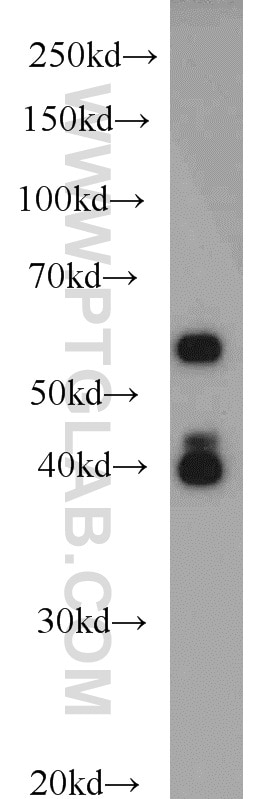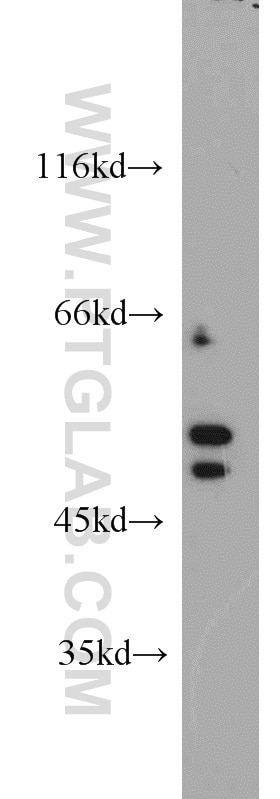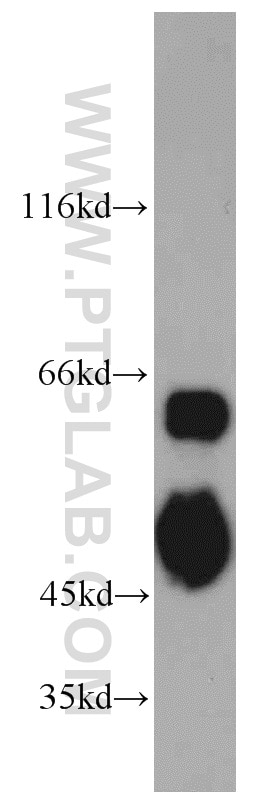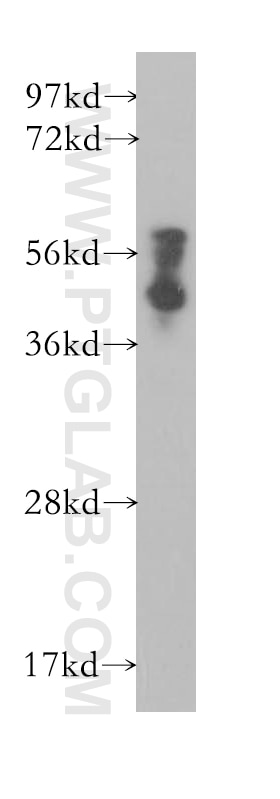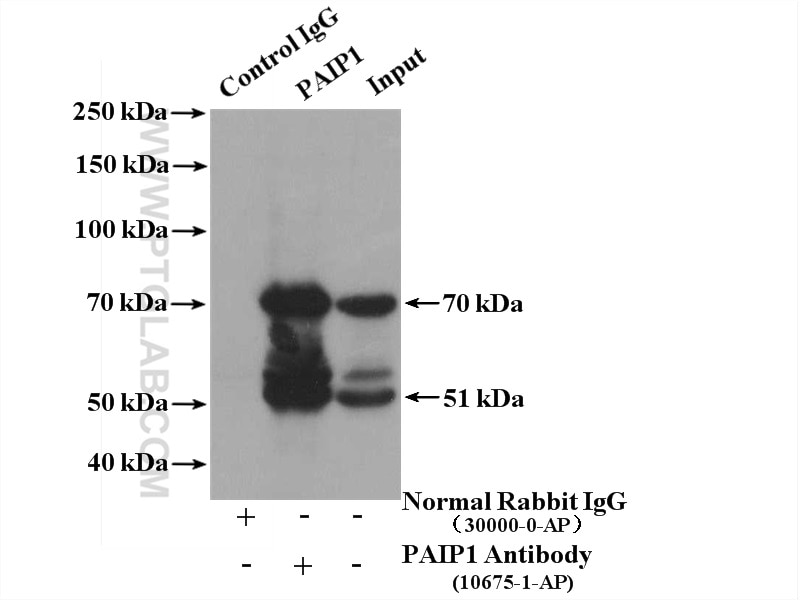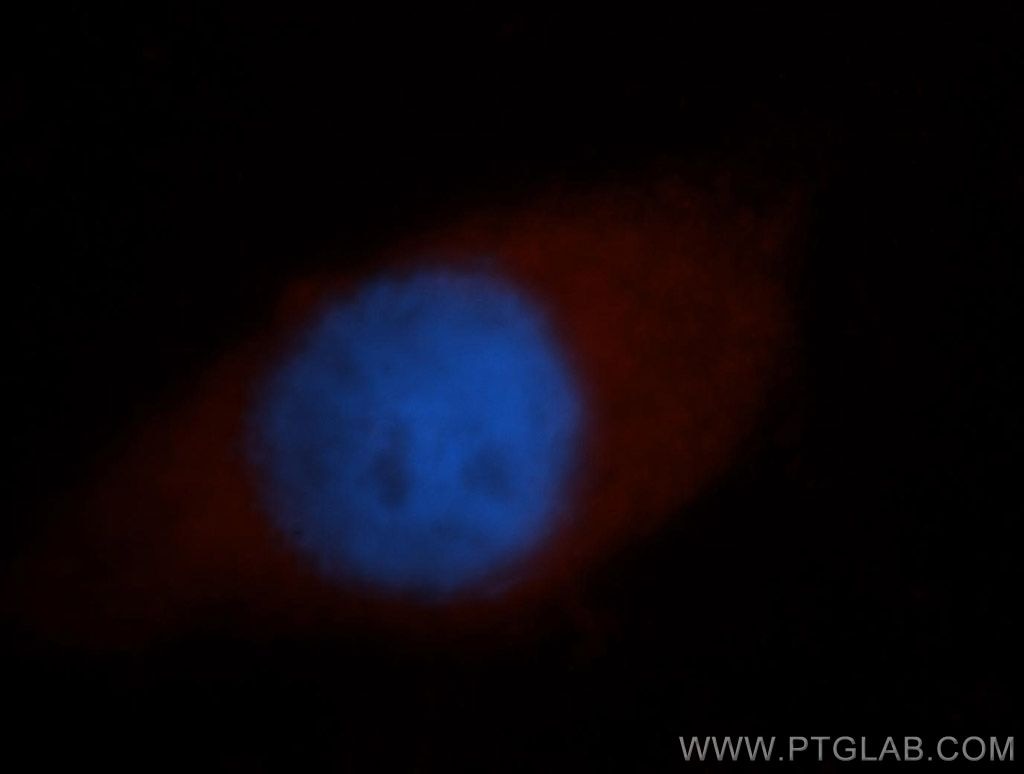- Phare
- Validé par KD/KO
Anticorps Polyclonal de lapin anti-PAIP1
PAIP1 Polyclonal Antibody for WB, IP, IF, ELISA
Hôte / Isotype
Lapin / IgG
Réactivité testée
Humain, singe
Applications
WB, IHC, IF/ICC, IP, ELISA
Conjugaison
Non conjugué
N° de cat : 10675-1-AP
Synonymes
Galerie de données de validation
Applications testées
| Résultats positifs en WB | cellules HeLa, cellules BxPC-3, cellules COS-7 |
| Résultats positifs en IP | cellules HeLa, |
| Résultats positifs en IF/ICC | cellules MCF-7 |
Dilution recommandée
| Application | Dilution |
|---|---|
| Western Blot (WB) | WB : 1:500-1:2000 |
| Immunoprécipitation (IP) | IP : 0.5-4.0 ug for 1.0-3.0 mg of total protein lysate |
| Immunofluorescence (IF)/ICC | IF/ICC : 1:20-1:200 |
| It is recommended that this reagent should be titrated in each testing system to obtain optimal results. | |
| Sample-dependent, check data in validation data gallery | |
Applications publiées
| KD/KO | See 3 publications below |
| WB | See 6 publications below |
| IHC | See 3 publications below |
| IF | See 2 publications below |
Informations sur le produit
10675-1-AP cible PAIP1 dans les applications de WB, IHC, IF/ICC, IP, ELISA et montre une réactivité avec des échantillons Humain, singe
| Réactivité | Humain, singe |
| Réactivité citée | Humain |
| Hôte / Isotype | Lapin / IgG |
| Clonalité | Polyclonal |
| Type | Anticorps |
| Immunogène | PAIP1 Protéine recombinante Ag1070 |
| Nom complet | poly(A) binding protein interacting protein 1 |
| Masse moléculaire calculée | 70 kDa |
| Poids moléculaire observé | 60 kDa, 51 kDa, 40 kDa |
| Numéro d’acquisition GenBank | BC005295 |
| Symbole du gène | PAIP1 |
| Identification du gène (NCBI) | 10605 |
| Conjugaison | Non conjugué |
| Forme | Liquide |
| Méthode de purification | Purification par affinité contre l'antigène |
| Tampon de stockage | PBS avec azoture de sodium à 0,02 % et glycérol à 50 % pH 7,3 |
| Conditions de stockage | Stocker à -20°C. Stable pendant un an après l'expédition. L'aliquotage n'est pas nécessaire pour le stockage à -20oC Les 20ul contiennent 0,1% de BSA. |
Informations générales
In initiation of translation in eukaryotes, binding of the small ribosomal subunit to mRNA requires recognition of the 5-prime cap structure by the cap-binding complex eIF4F. eIF4F consists of eIF4E, eIF4A, and eIF4G. Translation initiation is further regulated by the mRNA 3-prime poly(A) tail and the poly(A)-binding protein (PABC1). PAIP1 interacts with PABC1 and some eIF4 complexes [PMID:9548260]. It is a coactivator in the regulation of translation initiation of poly(A)-containing mRNAs, and associates with EIF4A and PABPC1 may potentiate contacts between mRNA termini [PMID:11051545].
Protocole
| Product Specific Protocols | |
|---|---|
| WB protocol for PAIP1 antibody 10675-1-AP | Download protocol |
| IF protocol for PAIP1 antibody 10675-1-AP | Download protocol |
| IP protocol for PAIP1 antibody 10675-1-AP | Download protocol |
| Standard Protocols | |
|---|---|
| Click here to view our Standard Protocols |
Publications
| Species | Application | Title |
|---|---|---|
Biochem J Biological Insights into the Expression of Translation Initiation Factors from Recombinant CHOK1SV Cell Lines and their Relationship to Enhanced Productivity. | ||
Biol Reprod Murine PAIP1 stimulates translation of spermiogenic mRNAs stored by YBX2 via its interaction with YBX2. | ||
Hum Pathol Paip1 predicts poor prognosis and promotes tumor progression through AKT/GSK-3β pathway in lung adenocarcinoma.
| ||
Exp Cell Res Role of Paip1 on angiogenesis and invasion in pancreatic cancer.
| ||
Cancer Res Treat Paip1 Indicated Poor Prognosis in Cervical Cancer and Promoted Cervical Carcinogenesis.
| ||
Arch Biochem Biophys YAP1-activated ZNF131 promotes hepatocellular carcinoma cell proliferation through transcriptional regulation of PAIP1 |
